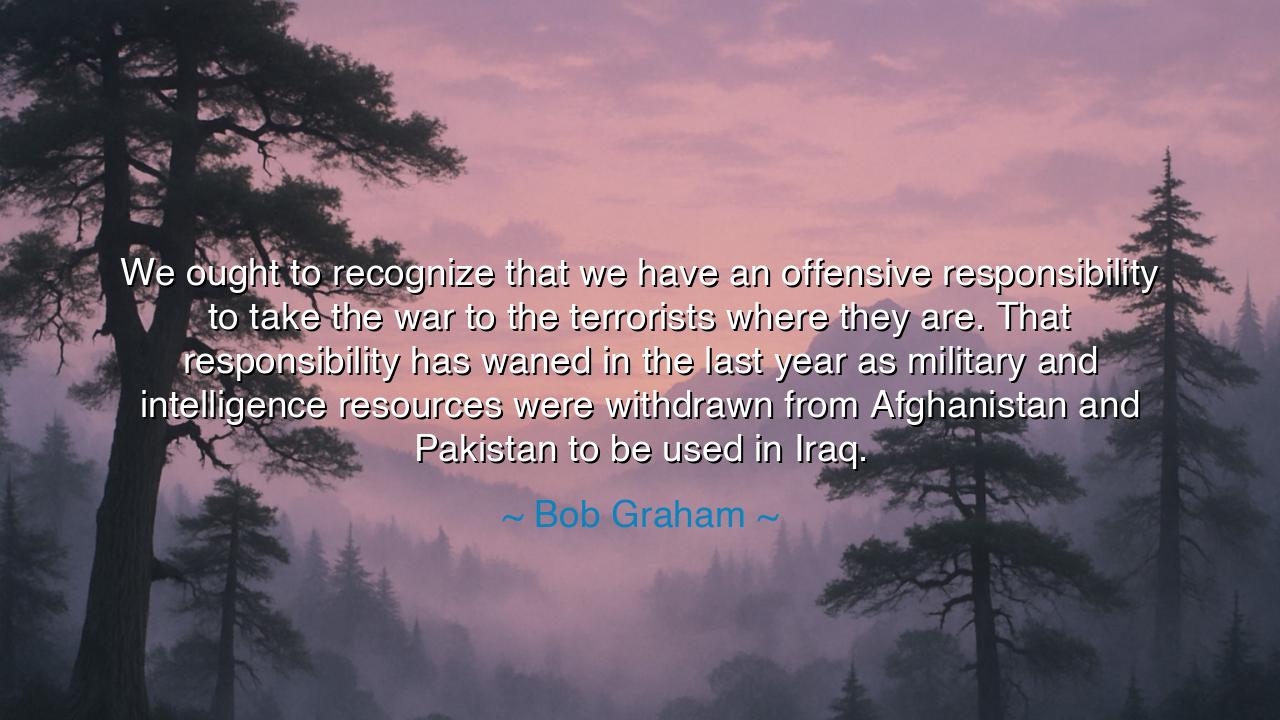
We ought to recognize that we have an offensive responsibility to
We ought to recognize that we have an offensive responsibility to take the war to the terrorists where they are. That responsibility has waned in the last year as military and intelligence resources were withdrawn from Afghanistan and Pakistan to be used in Iraq.






“We ought to recognize that we have an offensive responsibility to take the war to the terrorists where they are. That responsibility has waned in the last year as military and intelligence resources were withdrawn from Afghanistan and Pakistan to be used in Iraq.” Thus spoke Bob Graham, a man of sober vision and moral clarity, who warned his nation at a moment when its gaze had turned away from its true peril. His words were uttered in the troubled years following the September 11 attacks, when the wounds of terror were still fresh and the fires of vengeance still burned hot. Yet in that fire, Graham discerned the danger of distraction — the peril that comes when a people forget the root of their struggle and chase shadows instead of substance. His warning was not born of fear, but of duty — the ancient responsibility of the guardian to remind the watchmen where the true enemy stands.
At the heart of Graham’s words lies the idea of responsibility — not passive, but offensive, active, and deliberate. He speaks not of war for conquest, but of vigilance, of the moral and strategic burden to confront danger where it is born, not where it is convenient. To take “the war to the terrorists where they are” is not merely a call to arms, but a call to focus — to ensure that the righteous struggle against evil is not diluted by ambition or pride. In his time, he saw how the strength of armies and the will of nations were being redirected away from the mountains of Afghanistan and the tribal frontiers of Pakistan, where terror’s roots still festered, and instead poured into the sands of Iraq, where the purpose grew less clear and the costs multiplied.
It is an old lesson, echoed across the centuries: that those who lose sight of their true enemy court destruction. The ancient historian Thucydides tells us that the Athenians, once the defenders of freedom against Persia, turned their might upon Sicily — a war of vanity and distraction — and thus lost their empire. The pattern is the same: when power becomes unfocused, it consumes itself. So too did Graham see the shadow of Athens in his own nation’s missteps. His words were a plea for strategic wisdom, for the courage to fight not the war that flatters pride, but the war that protects truth.
In calling for renewed strength in Afghanistan and Pakistan, Graham invoked the principle that justice must strike at the source, not at the surface. The men who attacked on 9/11 had come from that region; the training camps, the financiers, the ideology — all were rooted there. Yet as attention and resources shifted elsewhere, the roots remained uncut, growing once more in the soil of neglect. Graham’s sorrow lay in this truth: that while the soldiers marched bravely, their leaders had lost the clarity of their mission. The heart of his quote is not a thirst for endless conflict, but a yearning for precision and purpose in the exercise of power.
And there is another layer to his teaching — one that transcends war and speaks to all who would lead or strive. For his words are not merely about armies and nations, but about the discipline of the soul. Every human being, like every empire, faces the temptation of distraction — to chase distant ambitions while the true battles, the ones that define destiny, are left unfought. Just as Graham warned against the diversion from the true front, so must each person guard against turning from the real work of their own life: the inner wars against fear, ignorance, and complacency. The offensive responsibility lies not only in governments but in individuals — to confront the darkness within and without, wherever it hides.
History offers many who heeded this call. Think of Winston Churchill, who, in the face of Nazi aggression, declared that Britain must fight “on the beaches, on the landing grounds, in the fields and in the streets.” He understood what Graham understood: that evil must be met where it rises, that passivity invites peril. The same truth guided leaders and warriors of old — from Alexander pushing eastward to face his foes before they reached his gates, to Washington crossing the icy Delaware, refusing to let despair rule the day. To hold fast to purpose, even when others waver, is the mark of true leadership.
Therefore, O listener, take this teaching to heart: do not abandon your front lines. Whether in the realm of nations or the battleground of the spirit, do not withdraw your strength from where it is most needed. The wars that matter — against terror, corruption, ignorance, or fear — must be fought at their roots, not their symptoms. Beware the comfort of distraction, the pride of conquest that leads you from your cause. Remember Bob Graham’s words, for they speak not only to governments, but to all who bear the weight of responsibility.
For when we forget where the true struggle lies, when we trade vigilance for vanity, we endanger not only victory but virtue. The lesson is clear and eternal: focus is the guardian of justice, and purpose is the soul of strength. Let us then keep our hearts fixed upon what is right and necessary, taking the battle — whether in policy, in conscience, or in life — to where it truly belongs. For only in doing so can we, as nations and as individuals, fulfill the sacred duty of those who strive not for glory, but for peace.






AAdministratorAdministrator
Welcome, honored guests. Please leave a comment, we will respond soon